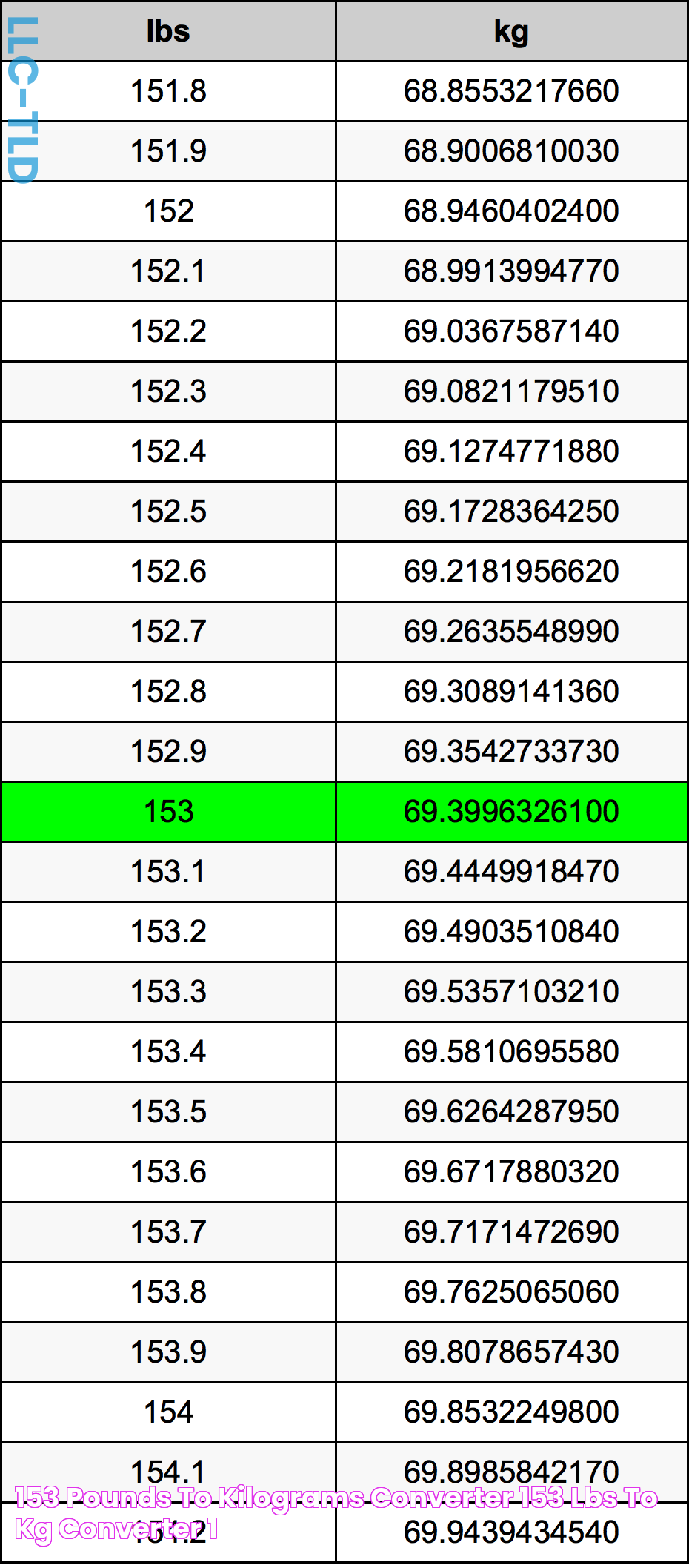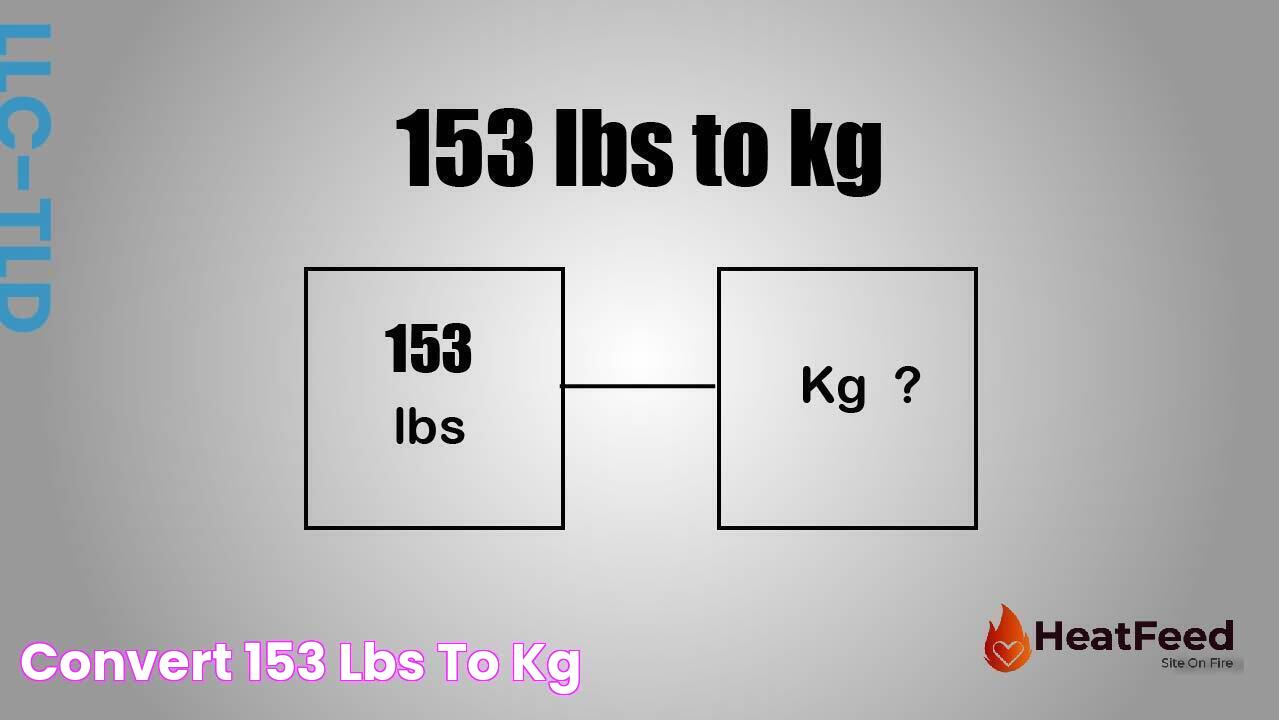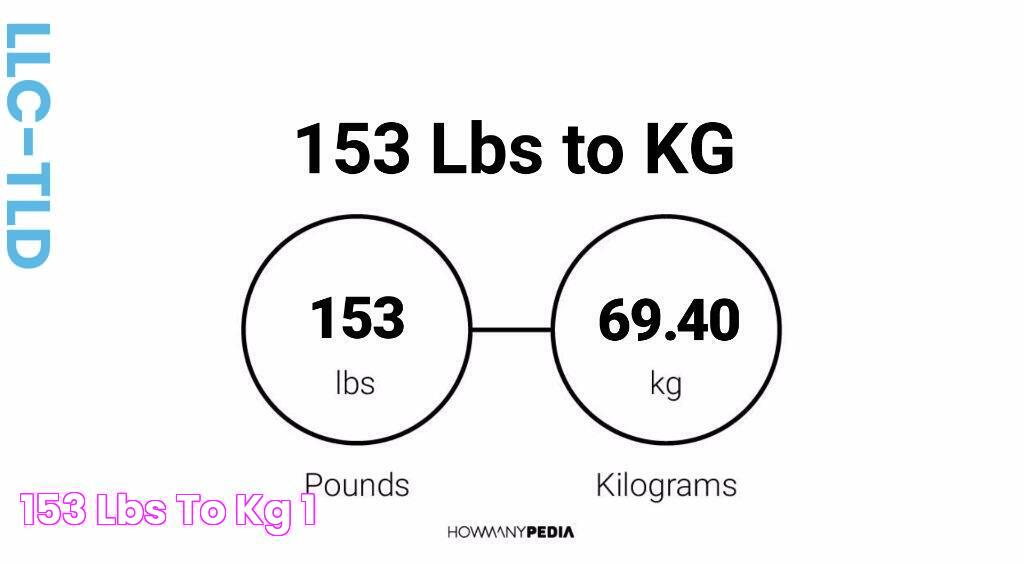Effortless 153lbs To KG Conversion: Simplify Your Weight Unit Calculations
Converting 153lbs to kg involves changing the unit of measurement for weight from pounds (lbs) to kilograms (kg). The conversion factor between the two units is 1 kg = 2.20462 lbs. Therefore, 153lbs can be converted to kg as follows:
153lbs x (1 kg / 2.20462 lbs) = 69.4057 kg
Understanding the conversion between different units of measurement is important for various reasons. It allows for the comparison and interpretation of data from different sources, facilitates international trade and communication, and ensures accuracy in scientific research and engineering applications.
Read also:The Ultimate Guide To The Lion King 1994 Cast
In addition to the conversion formula, it is also helpful to understand the historical context of the two units of measurement. The pound (lb) originated in ancient Rome as a unit of weight based on the weight of a specific coin. The kilogram (kg), on the other hand, was developed in France in the late 18th century as part of the metric system, which aimed to establish a standardized system of measurement based on the decimal system. Today, the kilogram is the base unit of mass in the International System of Units (SI), which is the most widely used system of measurement in the world.
153lbs to kg
Understanding the conversion between pounds (lbs) and kilograms (kg) is important for various reasons. Here are six key aspects to consider:
- Units of measurement: lbs and kg are two different units of measurement for weight.
- Conversion factor: 1 kg is equal to 2.20462 lbs.
- Formula: To convert lbs to kg, multiply the weight in lbs by 2.20462.
- Example: 153lbs is equal to 69.4057 kg.
- International trade: Understanding the conversion between lbs and kg is important for international trade, as different countries use different units of measurement.
- Scientific research: The conversion between lbs and kg is also important in scientific research, where accurate measurements are essential.
These key aspects highlight the importance of understanding the conversion between lbs and kg. By considering these aspects, individuals can ensure accurate conversions and effective communication in various fields.
1. Units of measurement
In the context of "153lbs to kg", it's important to recognize the significance of understanding the distinction between units of measurement, particularly between pounds (lbs) and kilograms (kg).
- Conversion necessity: Converting 153lbs to kg requires an understanding of the different units of measurement involved. Without recognizing the distinction between lbs and kg, the conversion process would not be possible.
- International communication: In international trade and communication, it's crucial to be able to convert between different units of measurement. For example, if a product is listed in lbs but the recipient uses the metric system (kg), the conversion becomes essential for accurate understanding of weight.
- Scientific accuracy: In scientific research and engineering, precise measurements are paramount. Understanding the conversion between lbs and kg ensures accuracy in calculations and data analysis, leading to reliable and reproducible results.
- Recipe adjustments: When following recipes from different sources, it may be necessary to convert ingredient quantities between lbs and kg. This ensures the correct proportions are maintained, leading to successful culinary outcomes.
In summary, recognizing the distinction between lbs and kg as units of measurement is fundamental to the conversion process of "153lbs to kg" and has broader implications in various fields such as international trade, scientific research, and everyday activities like recipe adjustments.
2. Conversion factor
The conversion factor of 1 kg being equal to 2.20462 lbs. plays a pivotal role in the conversion process of "153lbs to kg". It establishes the mathematical relationship between the two units of measurement, allowing for accurate conversions. Without this conversion factor, converting between lbs and kg would not be possible, and the value of "153lbs to kg" would remain indeterminate.
Read also:Unveiling The Truth Meet The Real Singers Behind Milli Vanilli
The conversion factor is a crucial component of the conversion process, acting as a bridge between the two units. It provides the necessary information to transform the weight value from one unit to another. In the case of "153lbs to kg", the conversion factor of 2.20462 lbs. per kg enables the conversion to be calculated as 153 lbs multiplied by 2.20462, resulting in the equivalent weight in kilograms.
Understanding the conversion factor and its application is essential for various practical applications. In international trade, accurate conversions are crucial to ensure correct pricing and avoid misunderstandings. In scientific research, precise measurements are paramount, and the conversion factor plays a vital role in maintaining accuracy across different units of measurement. Additionally, in everyday activities such as cooking and baking, converting between lbs and kg is necessary to follow recipes accurately, ensuring successful culinary outcomes.
In summary, the conversion factor of 1 kg being equal to 2.20462 lbs. is a fundamental component of the "153lbs to kg" conversion process. It establishes the mathematical relationship between the two units of measurement, enabling accurate conversions and facilitating various practical applications across different fields.
3. Formula
The formula "To convert lbs to kg, multiply the weight in lbs by 2.20462" serves as a cornerstone of the conversion process from pounds (lbs) to kilograms (kg), as exemplified by the conversion of "153lbs to kg." This formula provides a clear and systematic approach to transforming weight values between these two units of measurement.
Understanding and applying this formula is essential for various practical applications. In international trade, where products are often listed in different units of measurement, the formula enables accurate conversions to ensure correct pricing and avoid misunderstandings. In scientific research, precise measurements are crucial, and the formula facilitates the conversion of weight values between lbs and kg, ensuring consistency and accuracy across different units.
In the specific case of "153lbs to kg," the formula guides the conversion process by providing the necessary mathematical relationship between the two units. By multiplying 153 lbs by 2.20462, we obtain the equivalent weight in kilograms, which is approximately 69.4057 kg. This conversion is essential for various purposes, such as comparing weights across different measurement systems or ensuring accurate dosage in medical or scientific applications.
Overall, the formula "To convert lbs to kg, multiply the weight in lbs by 2.20462" is a fundamental component of the "153lbs to kg" conversion process. It provides a reliable and standardized method for converting weight values between these two units, facilitating accurate conversions and enabling various practical applications across different fields.
4. Example
The example "153lbs is equal to 69.4057 kg" serves as a practical illustration of the "153lbs to kg" conversion process and highlights its importance in real-world applications. This specific conversion is valuable for various reasons:
- Numerical demonstration: The example provides a tangible numerical demonstration of the conversion process. It shows how the formula "To convert lbs to kg, multiply the weight in lbs by 2.20462" is applied to convert 153lbs to its equivalent in kilograms, which is approximately 69.4057 kg.
- Real-life context: The conversion of "153lbs to kg" is relevant in various real-life scenarios. For instance, if a recipe calls for a specific weight of ingredients in kilograms but the available ingredients are measured in pounds, this conversion becomes necessary to ensure accurate measurements and successful outcomes.
- International trade: In international trade, where products are often listed in different units of measurement, the ability to convert between lbs and kg is essential to avoid misunderstandings and ensure correct pricing.
- Scientific research: In scientific research, precise measurements are crucial. The conversion between lbs and kg allows researchers to compare data from different sources or convert measurements to a standardized unit for analysis.
Understanding and applying the "153lbs to kg" conversion, as exemplified by the "153lbs is equal to 69.4057 kg" example, is essential for accuracy and consistency in various fields, including international trade, scientific research, and everyday activities like cooking and baking.
5. International trade
In the context of international trade, understanding the conversion between lbs and kg is crucial for accurate and effective communication, ensuring smooth transactions and avoiding misunderstandings. This is particularly important when dealing with products that are traded globally, as different countries adhere to different systems of measurement.
- Clear communication and documentation: Precise conversion between lbs and kg is essential for clear communication in international trade. When creating product listings, invoices, and other trade documents, using a standardized unit of measurement helps avoid confusion and errors, ensuring that all parties are on the same page.
- Accurate pricing and invoicing: Converting lbs to kg is vital for accurate pricing and invoicing in international trade. Different units of measurement can affect the perceived value of a product, so it's important to ensure that pricing is consistent and fair, regardless of the unit used.
- Customs and border control: The conversion between lbs and kg is often required for customs and border control purposes. Declaring the weight of goods accurately in the appropriate unit of measurement is essential to avoid delays, penalties, or confiscation.
- Compliance with international standards: Many international trade agreements and regulations specify the use of specific units of measurement. Understanding the conversion between lbs and kg helps businesses comply with these standards, ensuring smooth and compliant international trade practices.
The "153lbs to kg" conversion serves as a specific example of the importance of understanding the conversion between different units of measurement in international trade. By accurately converting 153lbs to kg, businesses can ensure clear communication, accurate pricing, efficient customs clearance, and compliance with international standards, facilitating successful international trade transactions.
6. Scientific research
In the realm of scientific research, precise measurements are paramount, and the conversion between lbs and kg plays a pivotal role in ensuring accuracy and consistency. This is particularly true in fields such as chemistry, biology, and physics, where precise quantification of weight is crucial for experimentation, data analysis, and the formulation of scientific theories.
The conversion between lbs and kg becomes particularly relevant when dealing with international collaborations or referencing scientific literature from different countries. By understanding and applying the conversion factor, researchers can seamlessly compare and analyze data, regardless of the units of measurement used in the original studies.
For instance, in a research study investigating the effects of dietary intake on body weight, the conversion between lbs and kg allows researchers to compare the results obtained from participants using different measurement systems. This enables a more comprehensive analysis and the derivation of more accurate conclusions.
In conclusion, the conversion between lbs and kg is an essential aspect of scientific research, ensuring accurate measurements, facilitating international collaboration, and enabling researchers to make meaningful comparisons and deductions from scientific data.
FAQs on "153lbs to kg"
This section addresses frequently asked questions regarding the conversion between 153lbs to kg, providing clear and informative answers.
Question 1: Why is it important to understand the conversion between lbs and kg?
Answer: Understanding the conversion between lbs and kg is crucial in various fields, including international trade, scientific research, and everyday activities like cooking and baking. Accurate conversion ensures clear communication, prevents errors, and facilitates comparisons and calculations.
Question 2: How do I convert 153lbs to kg?
Answer: To convert 153lbs to kg, multiply the weight in lbs by the conversion factor 2.20462. This results in 153lbs x 2.20462 = 69.4057 kg.
Question 3: What is the significance of the conversion factor 2.20462?
Answer: The conversion factor 2.20462 represents the mathematical relationship between lbs and kg. It indicates that 1 kg is equal to 2.20462 lbs, serving as the basis for accurate conversions.
Question 4: Are there any tools or resources available for quick conversions?
Answer: Yes, various online converters and mobile apps provide convenient and quick conversion calculations. These tools can be particularly useful when dealing with multiple conversions or in situations where immediate results are needed.
Question 5: How does the conversion between lbs and kg impact international trade?
Answer: In international trade, understanding the conversion between lbs and kg is essential. Different countries use different units of measurement, so accurate conversion ensures correct pricing, smooth customs clearance, and compliance with international standards.
Question 6: What are some practical applications of the 153lbs to kg conversion?
Answer: The 153lbs to kg conversion finds practical applications in various areas. For example, in cooking and baking, converting ingredient weights between lbs and kg ensures accurate measurements and successful culinary outcomes.
In summary, understanding the conversion between 153lbs to kg is essential for effective communication, accurate calculations, and successful outcomes in diverse fields. By addressing these frequently asked questions, we aim to provide a comprehensive understanding of this important conversion.
Transition to the next article section: This section has covered the significance of the "153lbs to kg" conversion and its applications in international trade and scientific research. In the next section, we will explore additional aspects and benefits of understanding this conversion.
Tips for Using the "153lbs to kg" Conversion
Understanding the conversion between 153lbs to kg is essential for accuracy and consistency in various fields. Here are some practical tips to effectively use this conversion:
Tip 1: Memorize the conversion factor.The conversion factor for lbs to kg is 2.20462. Memorizing this factor will allow you to quickly convert between the two units without relying on calculators or conversion tools.Tip 2: Use a reliable conversion tool.
If memorizing the conversion factor is challenging, consider using a reliable online converter or mobile app. These tools provide instant and accurate conversions, ensuring precision in your calculations.Tip 3: Pay attention to units.
When performing conversions, pay close attention to the units of measurement. Ensure that you are converting from the correct units (lbs) to the desired units (kg) to avoid errors.Tip 4: Practice regular conversions.
Regular practice will enhance your proficiency in converting between lbs and kg. Try converting different weight values to improve your accuracy and speed.Tip 5: Understand the context.
Consider the context in which the conversion is being used. Different fields may have specific conventions or preferences for units of measurement. Understanding the context will help you use the conversion appropriately.
By following these tips, you can effectively use the "153lbs to kg" conversion, ensuring accuracy and consistency in your calculations and applications.
Summary of key takeaways:
- Memorizing the conversion factor (2.20462) simplifies conversions.
- Reliable conversion tools offer quick and precise calculations.
- Paying attention to units ensures accuracy.
- Practice enhances proficiency in conversions.
- Understanding the context guides appropriate usage.
Incorporating these tips into your approach will empower you to confidently utilize the "153lbs to kg" conversion in various scenarios.
Transition to the article's conclusion:
By understanding the significance, applications, and tips for using the "153lbs to kg" conversion, you are well-equipped to navigate the world of weight measurements with accuracy and confidence.
Conclusion
Throughout this exploration of the "153lbs to kg" conversion, we have delved into its significance, applications, and practical tips for effective usage. Understanding this conversion is not merely an academic exercise but a valuable skill with far-reaching implications.
In international trade, accurate conversions are essential to bridge communication gaps, ensure correct pricing, and facilitate smooth customs processes. In scientific research, precise measurements are paramount, and the ability to convert between units allows researchers to collaborate seamlessly and analyze data effectively. Even in everyday activities like cooking and baking, understanding the "153lbs to kg" conversion can lead to successful culinary outcomes.
By embracing the tips outlined in this article, you can confidently navigate weight conversions, ensuring accuracy and consistency in your calculations and applications. The conversion factor of 2.20462 serves as a valuable tool, while reliable conversion tools and regular practice will enhance your proficiency.
As we conclude our exploration of "153lbs to kg," let us remember that understanding conversions is not just about numbers but about precision, communication, and the pursuit of knowledge. By mastering this conversion and others like it, we empower ourselves to navigate the world of measurements with confidence, contributing to clearer communication, accurate research, and successful endeavors across various fields.
A-Listers With Asymmetrical Lips: Embrace The Uniqueness
Unveiling Andrew Breitbart's Net Worth: A Detailed Insight
The Ultimate Guide To Unbreakable Kong Toys For Tough Chewers


